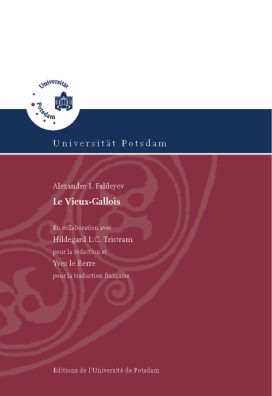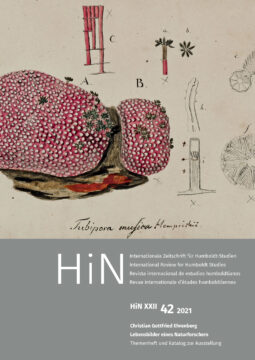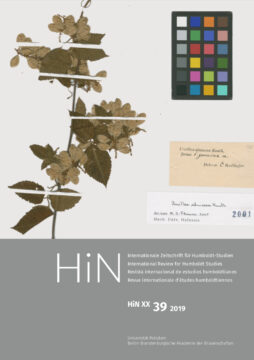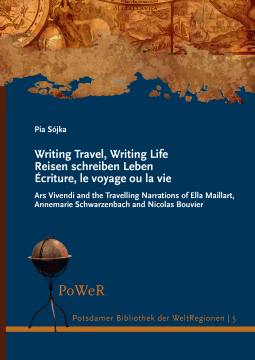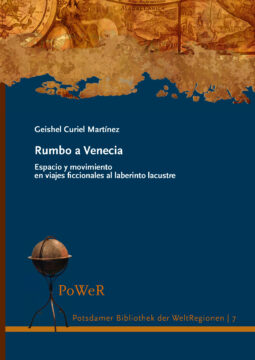This book offers, for the first time, a complete collection of the textual documents known so far in the Old Welsh language. Dr. Alexander I. Falileyev’s edition of these documents is ac-companied by a running linguistic commentary as well as a glossary. The grammatical section of the book orders all the linguistic evidence found in these texts in a systematic form. Both, the textual evidence and the linguistic analysis allow a complete picture of the present state of the research on the Old Welsh language. Dr. Falileyev’s book originally appeared in Moscow in 2002 (Древневаллийский язык (Drevnevalliskiy yazyk)). It was updated by the author in 2007 and translated by Prof. Yves Le Berre (Brest) into French, so as to make this important work accessible to scholars not versed in the Russian language. The Old Welsh language is not only important for a wider understanding of the evidence of the other medieval Insular Celtic languages (Irish, Breton and Cornish), but also for the his-tory of English, as Old Welsh was the first language that speakers of nascent English were in contact with.
- Sorry, this product cannot be purchased.
ISBN: 978-3-940793-44-7
152 pages
Release year 2008
47,00 €
Non-taxable transaction according to § 1 (1) UStG/VAT Act in combination with § 2 (3) UStG/VAT Act a. F. Providing this service, the University of Potsdam does not constitute a Betrieb gewerblicher Art/Commercial Institution according to § 1 (1) No. 6 or § 4 KStG/Corporate Tax Act. If the legal characterization of our business is changed to a commercial institution subsequently, we reserve the right to invoice VAT additionally. zzgl. Versandkosten
This book offers, for the first time, a complete collection of the textual documents known so far in the Old Welsh language. Dr. Alexander I. Falileyev’s edition of these documents is ac-companied by a running linguistic commentary as well as a glossary. The grammatical section of the book orders all the linguistic evidence found in these texts in a systematic form. Both, the textual evidence and the linguistic analysis allow a complete picture of the present state of the research on the Old Welsh language. Dr. Falileyev’s book originally appeared in Moscow in 2002 (Древневаллийский язык (Drevnevalliskiy yazyk)). It was updated by the author in 2007 and translated by Prof. Yves Le Berre (Brest) into French, so as to make this important work accessible to scholars not versed in the Russian language. The Old Welsh language is not only important for a wider understanding of the evidence of the other medieval Insular Celtic languages (Irish, Breton and Cornish), but also for the his-tory of English, as Old Welsh was the first language that speakers of nascent English were in contact with.
Recommended Books
-
 2021
2021Katrin Böhme, Ferdinand Damaschun, Anne Greenwood MacKinney, Mathias Grote, Regine Jahn, Wolf-Henning Kusber, Christoph Markschies, Ulrich Päßler
Alexander von Humboldt im Netz ; 22 (2021) 42
42,00 €Non-taxable transaction according to § 1 (1) UStG/VAT Act in combination with § 2 (3) UStG/VAT Act a. F. Providing this service, the University of Potsdam does not constitute a Betrieb gewerblicher Art/Commercial Institution according to § 1 (1) No. 6 or § 4 KStG/Corporate Tax Act. If the legal characterization of our business is changed to a commercial institution subsequently, we reserve the right to invoice VAT additionally.
zzgl. Versandkosten
Add to cart -
 2019
2019Reinhard Andress, David Blankenstein, Christiana Borchart de Moreno, Uwe Braun, Günter Hoppe, Peter Korneffel, Martin Röser, Ingo Schwarz, Natalia Tkach
Alexander von Humboldt im Netz ; 20 (2019) 39
15,00 €Non-taxable transaction according to § 1 (1) UStG/VAT Act in combination with § 2 (3) UStG/VAT Act a. F. Providing this service, the University of Potsdam does not constitute a Betrieb gewerblicher Art/Commercial Institution according to § 1 (1) No. 6 or § 4 KStG/Corporate Tax Act. If the legal characterization of our business is changed to a commercial institution subsequently, we reserve the right to invoice VAT additionally.
zzgl. Versandkosten
Add to cart -
 2023
2023Writing travel, writing life
16,00 €Non-taxable transaction according to § 1 (1) UStG/VAT Act in combination with § 2 (3) UStG/VAT Act a. F. Providing this service, the University of Potsdam does not constitute a Betrieb gewerblicher Art/Commercial Institution according to § 1 (1) No. 6 or § 4 KStG/Corporate Tax Act. If the legal characterization of our business is changed to a commercial institution subsequently, we reserve the right to invoice VAT additionally.
zzgl. Versandkosten
Add to cart -
 2024
2024Rumbo a Venecia
14,50 €Non-taxable transaction according to § 1 (1) UStG/VAT Act in combination with § 2 (3) UStG/VAT Act a. F. Providing this service, the University of Potsdam does not constitute a Betrieb gewerblicher Art/Commercial Institution according to § 1 (1) No. 6 or § 4 KStG/Corporate Tax Act. If the legal characterization of our business is changed to a commercial institution subsequently, we reserve the right to invoice VAT additionally.
zzgl. Versandkosten
Add to cart
Contact
Potsdam University Library
University Press
Am Neuen Palais 10
14476 Potsdam
Germany
verlag@uni-potsdam.de
0331 977-2094
0331 977-2292

